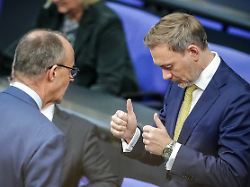“Reallocate expenses”
Lindner remains firm on the debt brake for 2024
December 1, 2023, 10:07 a.m
It is still unclear where the missing billions in the budget will come from. However, Finance Minister Lindner is optimistic in the Bundestag that the traffic light can implement important projects. Priorities would simply change. He doesn’t want to change the debt brake for 2024
Finance Minister Christian Lindner does not want to take on additional debt for the 2024 budget, but instead wants to save money. “We will redeploy on the expenditure side. In order to ensure that we realize future investments and important coalition projects, we will reprioritize other outdated expenditure that is no longer necessary today,” said the FDP politician in the Bundestag. “In any case, even more debt when interest rates have risen sharply is not the right way.”
He would rather spend money on future investments than on interest. The goals of the traffic light government remained competitiveness, decarbonization, prosperity for all and social balance. “After the verdict, these goals remain correct, but we will find other new ways to get there,” he announced.
Lindner introduced the supplementary budget for the current year in the Bundestag. He defended it and described it as a consequence of the Federal Constitutional Court’s ruling. In retrospect, the Economic Stabilization Fund (WSF) was invested incorrectly, explained Lindner. The government’s energy price support comes from the special pot.
45 billion euros in the supplementary budget
With the supplementary budget, a total of around 45 billion euros will be transferred to the normal budget, mainly from the WSF. To achieve this, the debt brake anchored in the Basic Law must be suspended again for the fourth year in a row. The decision on this is planned for mid-December.
As a result of the ruling, 60 billion euros will be removed from the reserves of the KTF climate fund because part of the fund’s resources were transferred to the special pot in an unconstitutional manner. Other so-called special funds also need to be reorganized, with the supplementary budget in addition to the WSF on the relief fund for reconstruction after the flood in summer 2021. “Now we are creating legal certainty,” said Lindner. The WSF will then expire at the end of the year.
Lindner added that the national debt ratio will fall to 64 percent of economic output in 2024, after it was 69 percent in 2021. “The direction is right. We want to continue it.” Lindner hardly gave any details about the stalled negotiations on the draft budget for 2024. He again put the financing gap at 17 billion euros. How this hole should be closed is controversial within the traffic light government. Lindner spoke of intensive discussions. “None of this will always be comfortable.” But the government will find new ways to finance its projects.
